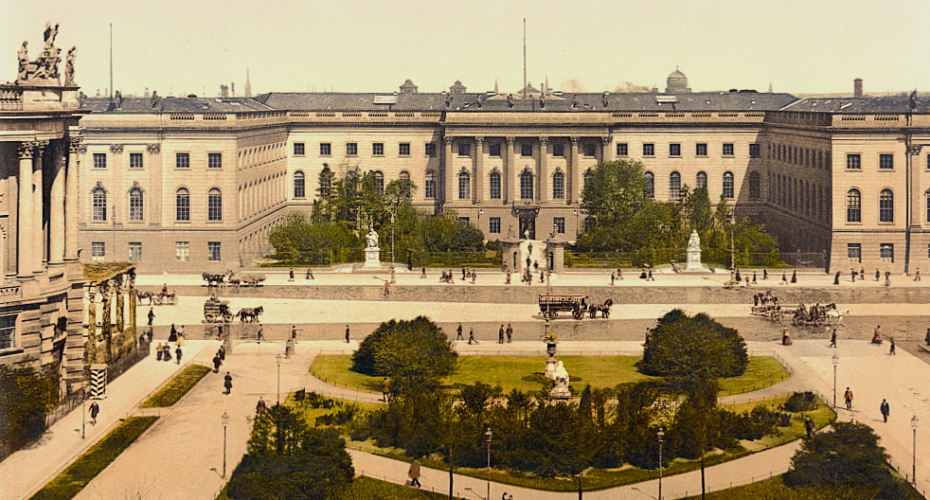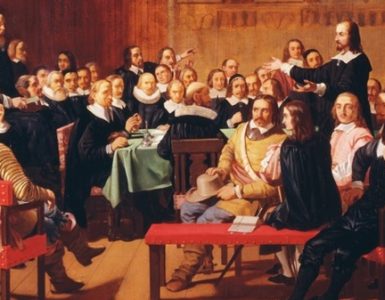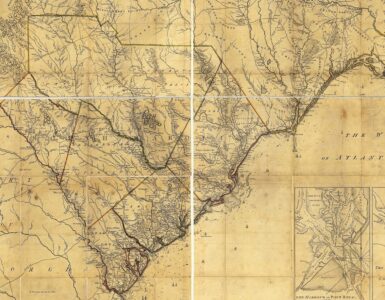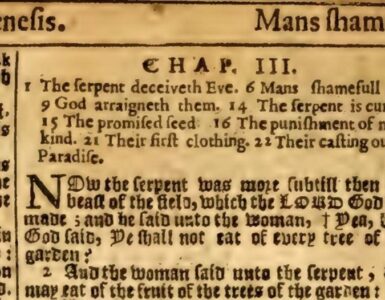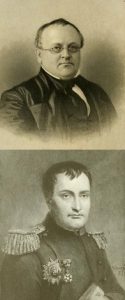 They said he looked like Napoleon Bonaparte. Students entered the lecture hall in fear and trembling as they anticipated what the lesson would be like. He read sermons with his head bowed motionless over the pulpit but his preaching was admired. He absorbed languages like a sponge; it is believed he knew over thirty. However, there was a softer side to Addison, as he was called, a side that was rarely seen even by his closest friends. The resemblance to Napoleon is not so clear in these portraits, so maybe the students’ interpretation of the two was influenced by their experiences with Addison and his Napoleon like command.
They said he looked like Napoleon Bonaparte. Students entered the lecture hall in fear and trembling as they anticipated what the lesson would be like. He read sermons with his head bowed motionless over the pulpit but his preaching was admired. He absorbed languages like a sponge; it is believed he knew over thirty. However, there was a softer side to Addison, as he was called, a side that was rarely seen even by his closest friends. The resemblance to Napoleon is not so clear in these portraits, so maybe the students’ interpretation of the two was influenced by their experiences with Addison and his Napoleon like command.
Joseph Addison was born April 24, 1809 the third son of Archibald Alexander. At the time, Alexander was the minister of Pine Street Presbyterian Church in Philadelphia. His mother, Janetta Waddel Alexander, was the daughter of a minister in Virginia named James Waddel who was known as “The Blind Preacher of Virginia.” Archibald Alexander continued his pastorate in Philadelphia until the general assembly called him to be the first professor of its Presbyterian Seminary at Princeton in 1812.
By the age of ten Addison had learned the fundamentals of Latin, Greek, and Hebrew. By the age of twelve he acquired Arabic and had used it to read the Koran. He entered Princeton College with the junior class at the age of fifteen then graduated in 1826 with highest honors of his class of twenty-nine. His fellow students commented that his intellect and speaking ability surpassed that of some of the college faculty. He was elected a tutor at Princeton College, but instead, at the age of nineteen, he became the teacher of Latin, Modern and Ancient History, Ancient Geography, and Composition in the Edgehill School at Princeton.
Addison studied theology on his own with guidance from his father and others at the seminary including Charles Hodge. He began teaching as Adjunct Professor of Ancient Languages and Literature at Princeton College, 1830-1833, during which time he was licensed and ordained by New Brunswick Presbytery. Following studies in Germany at the universities at Halle and Berlin, Addison began teaching at Princeton Seminary as Instructor of Oriental and Biblical Literature, then in 1835 he was promoted to Associate Professor of the same field before achieving full professorship in 1840. He was transferred to the Chair of Biblical and Ecclesiastical History in 1851, with his final position in the department of Hellenistic and New Testament Literature in 1859.
As is sometimes the case with geniuses like Alexander, his interpersonal skills were not the best. T.V. Moore was a student and friend who described Addison as a “recluse in his habits and reserved in his manners.” He also mentioned that the students regarded him as a “prodigy of learning” who was susceptible to the use of sarcasm that they hoped would not be directed at them to pin them to the oratory wall in shame. Moore’s own friendship with Addison began in his Hebrew classes, but he added, “I never could wholly divest myself of a certain fear in my association with him, but I found him much more accessible and kind than I expected.”
A particularly memorable example of Dr. Alexander’s propensity for sarcasm was related by Moore. In a discourse by a student on the book of Genesis which Moore described as “very pretentious,” when it came time for Alexander to comment he said the discourse “consisted of two parts; that which everybody knew, and that which nobody knew; and that he did not think that under either head the student had added to the stock of their knowledge.” Moore commented that sometimes Addison used his satire severely, “though I do not think unjustly.”
The closeness of the friendship between Alexander and Moore is exemplified by a visit to Richmond where Moore was a minister. Addison conducted himself in the manse of the First Presbyterian Church “very much as he would have done in his own home.” Moore knew that Addison was reluctant to stay with families, but he thought their friendship as professor and student might aleviate his reluctance. Moore was relieved when Addison arrived and became as one of the family as well as one of his finest and most congenial guests. Moore commented that he regretted not trying to draw out more personal information from Addison because he generally would not speak about himself. On one occasion, one of the Moore children was in bed recovering from a sickness. At one point the Moores realized that they had not seen Alexander recently. They searched the house and found him amusing the sick child with stories. It may have been that Addison’s own lack of wife and family was blessed and filled by his relationship with T. V. Moore’s family.
Joseph Addison Alexander suffered a hemorrhage and died in his study, January 28, 1860, at the age of only fifty years. The New York Times commented in an obituary that as a scholar he “had no superior” in America and he spoke almost “all the modern languages of Europe.” He was described as “retired in his habits” and was not a socializer in “general society.” The Times ended its memorial observing that his “loss as an instructor will be keenly felt by the seminary.”
J. A. Alexander was a prolific writer. In the seminary journals alone he published over seventy articles and reviews. His books include, The Earlier Prophecies of Isaiah, 1846, and The Later Prophecies of Isaiah, 1847; The Psalms: Translated and Explained, 1850, in three volumes; The Acts of the Apostles Explained, in two volumes, 1857; The Gospel According to Mark, 1858; Notes on New Testament Literature and Ecclesiastical History, 1860; Sermons, in two volumes were also published in 1860; and finally, The Gospel According to Matthew, which the preface describes as the “last work on which the pen of Dr. Alexander was engaged” was published in 1860. Log College Press’s collection of his works in PDF can be accessed at, “Joseph Addison Alexander (1809-1860).” He earned the A. M. from Princeton College in 1829 and was honored with the Doctor of Divinity first by Rutgers University, then later by Franklin and Marshall College.
Barry Waugh
Notes– This biography was first posted October 23, 2014 and was edited and revised January 31, 2025. The header is “The University, Berlin, Germany,” published between ca. 1890 and ca. 1900 in Detroit as from the New York Public Library Digital Collection. The main source for this biography is Henry Carrington Alexander’s two volume work about his uncle titled, The Life of Joseph Addison Alexander, New York, 1870; notice that the page numbers are sequential from vol. 1 to vol. 2. The T. V. Moore items were found in 1:478-79 and 2:753-56. The Life of Archibald Alexander, D.D., LL.D., by his son, James W. Alexander, 1856, was also consulted.


